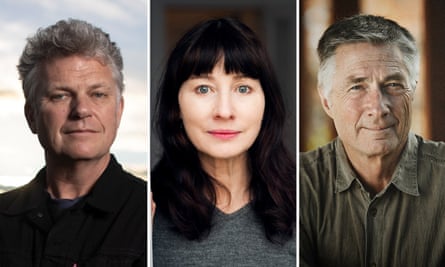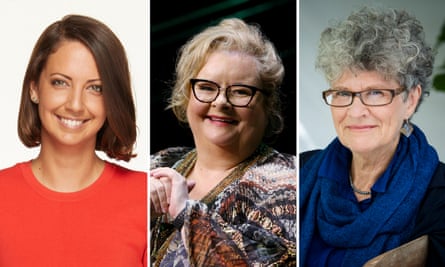The Australian publishing calendar is packed with ambition this year: the post-pandemic torpor is finally shifting, and in its place is a literature that feels alive with possibility.
Here is a whirlwind tour of what’s to come.
Fiction
Big names, big ideas
The reading year begins with a high-octane swerve from Shankari Chandran. Known for her socially compassionate fiction (the Miles Franklin-winning Chai Time at Cinnamon Gardens, 2022), Chandran delivers her first political thriller with Unfinished Business (January, Ultimo), set in the tumult of postwar Sri Lanka.
Diana Reid is also trying new things with Signs of Damage (March, Ultimo), trading her Austenesque snark for something more ambiguous and discomforting – and delivering her best work since Love and Virtue (2021).
But it’s Yumna Kassab – dauntless as ever – who is taking the biggest risk of early 2025 with The Theory of Everything (March, Ultimo): a wheeling, unpinnable squall of a book (just read the brain-bending blurb).
Enthralling debuts
It’s a high-energy year for debut fiction. The former Sydney Swans player Brandon Jack brings us Pissants (July, Summit Books), an AFL novel that’s as antic as the sport it documents. The former Triple J presenter Vijay Khurana also writes about twitchy young men in The Passenger Seat (April, Ultimo) – a tale of reckless bravado and a lonely highway. And Dominic Amerena’s I Want Everything (May, Summit) is set in the literary world – with all its ruthless gossip – and built around the relationship between a story-hungry young writer and a famous recluse.
Two of the year’s most promising debuts look outward: Natasha Rai’s An Onslaught of Light (March, Pantera) and Raaza Jamshed’s What Kept You (July, Giramondo) are both heartfelt stories of migration, self-invention and familial reckoning.
Mid-career magic
The literary world tends to celebrate shiny new writers and canonical stalwarts and neglect everyone in between – but you should keep a look out for mid-career offerings from: Robert Lukins (February, Allen & Unwin), Madeleine Ryan (February, Scribe), Luke Horton (March, Scribe), Gretchen Shirm (April, Transit), Jennifer Mills (June, PanMac), Marija Peričić (June, Ultimo), Katherine Brabon (July, Ultimo), Zeynab Gamieldien (August, Ultimo) and Sofie Laguna (October, Penguin Random House), to name just a talented handful.
And make particular space on your 2025 to-read pile for Madeleine Watts’ Elegy, Southwest (March, Ultimo). It’s a road trip novel that unfolds against the backdrop of California wildfires. In the Anthropocene, all fiction is eco-fiction.

Playful premises
From supernatural thought experiments to post-human elegies, Australian authors are having a great deal of high-concept fun this year. In Orpheus Nine (March, Hachette), Chris Flynn obliterates every nine-year-old kid on the planet. In Little World (May, Black Inc), Josephine Rowe brings a long-dead saint back to life in a small country town. In First Name Second Name (March, UQP), Steve MinOn sends a restless corpse on a road trip. And in Letters to Our Robot Son (May, Ultimo), Cadance Bell explores what it means to be human in a heart made of circuitry.
These are glib descriptions. Some of the most soul-rattling writing of the year is here.
Forgotten women
It’s a literary trend that shows no sign of slowing: novels of historically sidelined women. In Nightingale (May UQP), Laura Elvery inhabits Florence Nightingale, that mighty reformer turned nursemaid cliche. In The Bearcat (June, PanMac), Georgia Rose Phillips explores the world of Anne Hamilton-Byrne, the 1960s cult leader who claimed to be Jesus reincarnate. And in The Secret Year of Zara Holt (June, Hachette), Kimberley Freeman spends some time inside the grieving mind of Harold Holt’s widow, Dame Zara Bate.
But the most culturally hefty offering comes from debut writer Lucy Nelson, whose short story collection Wait Here (July, Summit) explores the quiet camaraderie – and diverse invisibility – of childless women.
Revolutions and revelations
Some of the most compelling new Australian fiction is anchored in geopolitics, taking us from the snare of 1980s Iran (Hossein Asgari, Desolation: September, Ultimo), to the Japanese occupation of Hong Kong (Emma Pei Yin, When Sleeping Women Wake: July, Hachette), to the high-society backrooms of 1920s Saigon (Jacquie Pham, Those Opulent Days: February, Ultimo).
And drawing on first-hand experience, Ouyang Yu brings China’s Cultural Revolution to life in The Sun at Eight or Nine (March, Puncher & Wattmann).
A bonanza of bloodshed

The biggest names in Australian crime fiction are returning to the page, including Candice Fox, Garry Disher, Michael Robotham, Benjamin Stevenson, Mark Brandi, Shelley Burr and Mandy Beaumont, as well as dozens of bloodthirsty debuts. All the red-dust tropes of Aussie noir are here: hardscrabble towns, taciturn strangers, lost girls – tropes that the Guardian columnist Paul Daley interrogated in his last novel, Jesustown. His follow-up, The Leap, is due in August (Summit).
Some of the country’s most accomplished lit-fic writers are also playing with mystery and murder this year, including Gail Jones (The Name of the Sister: June, Text) and James Bradley (Landfall: April, PRH). It sounds like Kate Mildenhall has had a ball writing The Hiding Game (September, Scribner), which she describes as “The Slap meets Nine Perfect Strangers gone feral”.
Nonfiction
Ozlit stars and famous faces
It is shaping up to be a mighty year for Australian nonfiction. The much-loved Robert Dessaix has a memoir – Chameleon (March, Text) – described as a “freewheeling magic carpet ride” through his life and mind. So does Geraldine Brooks, although hers is a grief-racked love story, written in the aftermath of her husband’s death (Memorial Days: February, Hachette).
The television presenter Brooke Boney has a thoughtful essay collection out this year (All of It: April, Allen & Unwin), and there are persistent rumours that the ever-fabulous Magda Szubanski will delight readers with another memoir. But the movie star – and honorary Australian – Naomi Watts definitely has a book ready: a guide to menopause, anchored by her own experience (Dare I Say It: January, PRH).
The lauded Aussie novelists Kate Grenville and Hannah Kent have both turned to nonfiction in 2025 to consider questions of self and place. For Grenville this means a journey into her ancestral past (Unsettled: April, Black Inc); for Kent, a reckoning with her muse-like love of Iceland (Always Home, Always Homesick: May, Picador).

Forgotten women redux
The history – and legacy – of Australia’s literary women is as rich as it is undersung, and so it is heartening to see a concerted effort to tell the stories of our storytellers (see Inconvenient Women by Jaqueline Kent and Elizabeth Harrower: A Life Of Fiction by Guardian book critic Susan Wyndham, both out with NewSouth).
In particular, this year marks the 50th anniversary of the film Picnic at Hanging Rock – that gauzy, Aussie-gothic fever dream. It’s the perfect time to explore the life of Joan Lindsay, the author of the source novel, whose life was as beguiling as her fiction (Joan Lindsay by Brenda Niall: February, Text).
And speaking of forgotten women: All Women Want (March, HarperCollins) – by Guardian Australia’s lifestyle editor, Alyx Gorman – is about bridging the pleasure gap between men and women in the (heterosexual) bedroom. There’s plenty more writing about sex politics, power and consent ahead too: see Groomed by Sonia Orchard (February, Affirm) and Sweet Nothings by Madison Griffiths (July, Ultimo). The mighty Drusilla Modjeska joins this conversation with Her Art Her Body (June, PRH), an illustrated study of six trailblazing European artists: modernist women who “literally recast the ways in which women’s bodies, and art, could be seen”.
National reckonings
For the 50th anniversary of the Whitlam dismissal, expect to be swamped by Gough commentary (and nostalgia) (eg Blue Poles by Tom McIlroy: March, Hachette). The national soul-searching continues with Osman Faruqi’s long-promised The Racist Country (May, PRH); and Guardian Australia reporter Ariel Bogle’s collaboration with Cam Wilson, Conspiracy Nation (August, Ultimo), which shows the democracy-ravaging consequences of unchecked misinformation.
And Australia’s golden age of eco-writing continues in all its monstrous, tragic irony (see: Human/Nature by Jane Rawson: April, NewSouth; and Silence is my Habitat by Jessica White: October, Upswell).
True crime
Two books will consider the fatal police shooting of the Warlpiri teenager Kumanjayi Walker, and its national refractions (The Red House by Kate Wild: May, Allen & Unwin; and Kumanjayi: Death and Indifference by Jack Latimore: April, Scribner).
There’s another pair considering the Kathleen Folbigg case: one by the journalist whose work was central to her acquittal (Meadow’s Law by Quentin McDermott: February, HarperCollins); and a first-hand account from Folbigg herself (Inside Out: September, PRH).
Also in true crime, Walter Marsh offers a tale for lepidopterists, with The Butterfly Thief (November, Scribe).
Poetry and prose
The Stella prize winner Evelyn Araluen has a new volume out in September, The Rot (UQP), which is described as “what happens when poetry swallows more rage than it can console”. And in The Nightmare Sequence (April, UQP), the poet Omar Sakr and graphic novelist Safdar Ahmed respond to the atrocities in Gaza with a work of searing inquiry and humane grace.

If you’re excited by form play, keep a look out for work by Grace Yee (Joss: June, Giramondo), Helena Pantsis (Captcha: March, Puncher & Wattmann) and Eileen Chong (We Speak of Flowers: February, UQP). Chong’s new volume is an invitation to participate: 101 fragments that can be read in any order.
And what better way to end the reading year than with the multidisciplinary love letter Roach and Hunter (November, Fremantle Press). Edited by Kim Scott, this joyful anthology of First Nations writing honours the extraordinary musical legacy of Uncle Archie Roach and Aunty Ruby Hunter.
This post was originally published on here







